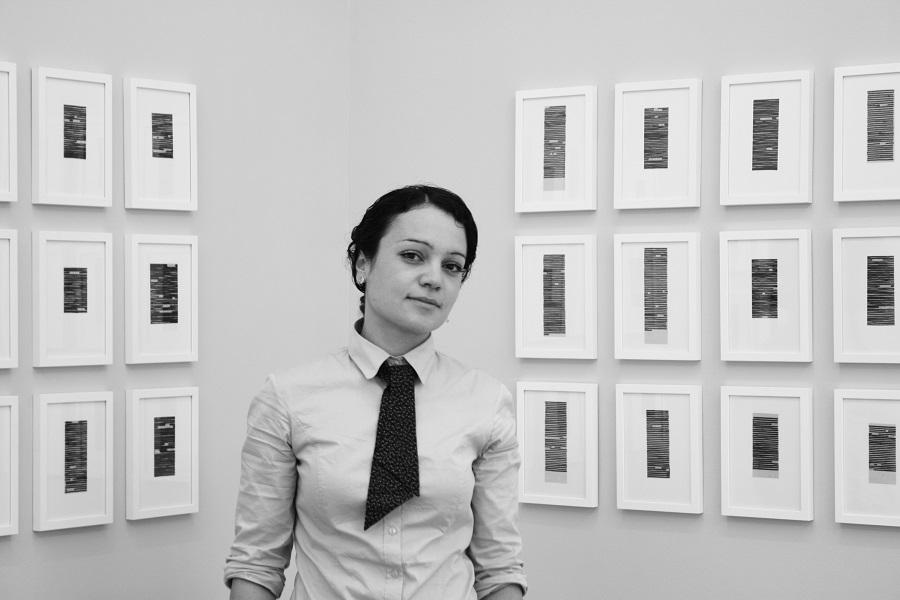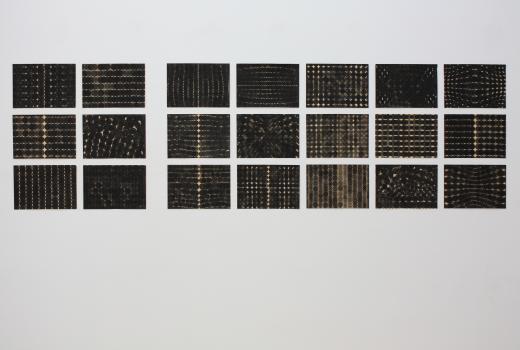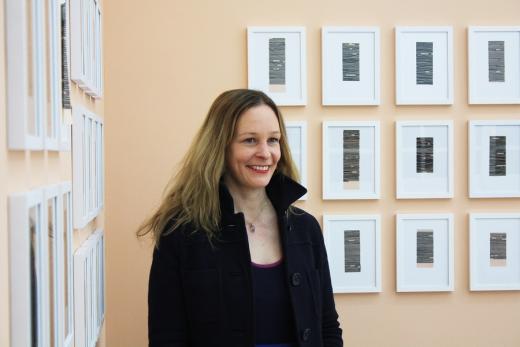Have You Met... Manière Noire
Have You Met... Manière Noire

After a moderate pause, Manière Noire relaunched with new looks and ideas. Majla Zeneli's fresh new concept for the gallery had sparked our curiosity immediately, as it forms a unique spot in the Berlin art landscape. With the new series of exhibitions, the focus has shifted to the language - its presence, absence, and artful interpretations in between. Visual art and poetry seem to have found a new favorite playground at this charming little gallery in Moabit.
Tell us how it all started with Manière Noire.
Manière Noire developed from the enthusiasm for sharing. It started from an individual atelier for editions, and then took the final and professional shape of a project space / gallery. In the meantime it has in itself been a school, for understanding curating as a system of working selectively.
What is the main focus of your work? What interests you most and how does it reflect in your curatorial role?
My urge was to show artists who write or who are involved in working with text or whose language of images resembles a visualized poem. And of course, inspired by the poet Kenneth Goldsmith, I thought of including poetry as part of my platform's focus, which is so present but also barely noticed. It is astonishing sometimes to feel how much these two artistic practices are related, how much they give and take, derive from or influence each other: “Painting is poetry that is seen rather than felt, and poetry is painting that is felt rather than seen” - said Leonardo da Vinci. Moreover it is striking to learn how many visual artists write and sometimes vice versa. I am thinking here of Herta Müller's collages... Here is a case where the viewer/reader is confused or can be asked both questions: Have you SEEN this poem, or have you READ this collage?
" sag mal fragt einer spricht man bei euch
am Tisch Fasanisch gewiss sag ICH erst
gestochen dann gebrochen man fährt auch
mit dem weißen LIFT im Zahn man mischt
das Mehl man drischt das Gras und
klebt DEM letzten Hund das Fell mein
Naturell war mal ein weißer Besenreiser
und wußte wie man mit der Fliege
auf der Nase lacht mit dem Bauch in einen
Nagel tritt und keine Flecken macht"
For me it is also significant to know the process of how an artist's mind works. Being an artist for me is like having the third eye in the forehead, seeing the invisible, or highlighting the most important, making exact and detailed schemes of thoughts, like in the film "A beautiful Mind". What is being decisive at making the proper choices in the economic words of Anke Becker, which are created from Financial Times articles? Only a beautiful mind can, from a dry economical report, make a poem like this:
„I was allowed to travel
through
fields
and
glasshouses”.
And now, thinking of every artist as a unique experience, you would probably never want to stop.
How do you choose the artists you represent?
It depends. There were artists that I had encountered in the past and I already had an accurate overview of their oeuvre and knew accordingly that they would appeal in harmony with my project, and sometimes there were occasions of spontaneous meetings where my wonderment was prompt and at hand.
From my point of view the only thing that matters is to be open to constantly meeting artists and people, to know, to listen, and to be curious of knowing to learn. At the end it is not about the didactic or the moral, it is about expressing oneself: What is it to... or How does it feel to... In few words, to be conscious of one's experience of being here on earth and / or living life. At the end what do poets do? They write down simple descriptions of what they see. And to be honest, isn't planetary life poetry? Take away all the struggle for money and greed for power, take away politics. Isn't rain poetry, the cyclical turn of seasons, and nature? We have lost our sensitivity.
Which new ideas and concepts did you bring with the relaunch of Manière Noire? What is the current series "Appropriating Language" about?


Anke Becker / "Economic Words - Mein Kapital"
Manière Noire relaunched in December of 2014, after a moderate pause, not only with a completely new look but also with new ideas and concept of future shows. The focus of the exhibitions is thus the language, its presence, its absence and artful interpretations in between those two states.
Words were absorbed in to the flesh ("I'd Like a Piece of Paradise by Helen Acosta Iglesias), poetries were rewritten in form of monthly calendar sheets ("It all started a 17th of January, one million years ago." by Pierre Granoux), words are rearranged to create new texts and meanings within texts ("Economic Words - Mein Kapital " by Anke Becker), words will be pop up drawings (Kobro-Book by Malgorzata Malwina Niespodziewana), words will be put in artist's statements ("MAKEARTHISTORY" by Maurice Doherty), words will be sculptural installations (by Raul Meel), paintings will be a comment to an essay (by Emmanuelle Castellan) etc, etc...
All these exhibitions will not tend to abandon the figurative, the representational codes of a descriptive convention and embrace the conceptual and the ephemeral. Neither will they try to act as cutting-edge, innovational happening, as the language pieces began to appear in the beginning of the XX Century to intensify, mostly in the '60s but still very present now.
In the case of "APPROPRIATING LANGUAGE" Series, reinvesting with the text will be an experimental practice of contemporary artists who use the spoken/written word as an impulse of a further thinking and/or dialogue between them and other people, and as an essential communication and deeper connection with each other as well as with the place they (we) all live in.
What are you currently working on?
I am putting efforts at the moment to bringing to the space more poetical encounters. Involve more writers and poets so that Manière Noire becomes a meeting place of exchanging ideas and experiences.
An upcoming event is Bur(r)y your old love!, a performance and reading poetry planed for the 1st of April by a Berlin notable poet, Hendrik Jackson.
Instead of going through a religious mourning lament, the idea of the poet was to try to bid farewell to more earthy feelings, like loss of our old loves for example, that is difficult to render extinct. During the Ash Wednesday friends will be encouraged to participate. Placed in a small bowl, love letters and other symbolical remains will be collectively burned to ashes, which afterwards will be literally transferred by the poet to Istanbul
(a pilgrimage to Constantinople) and spread into the wind. Whereas on Easter Monday we will all celebrate the resurrection of love, in short, beatify its new come.
Another poetry project (planed for the 20th of June 2015) will be a single evening event called Poetry Corner of POETRY FESTIVAL BERLIN, where again, Hendrik Jackson together with other writers such as Dmitrij Dragiljew, Ilya Rivkin will recall and memorize the young Russian poet, Victor Ivaniv.
I also want to start a PICTURE WINDOW Series, which will be a short term (few days only) display of art pieces directly next to the window glass even if the gallery is closed. This is starting already on the 1st of May, during the Gallery Weekend with the conceptual artist, Franz John.
Not to forget my strong wish to participate in September in Positions Berlin Art Fair, for which I have already prepared a good proposal.
What is the most important thing you have learned so far by running an art space? Which advice would you give to people who wish to follow that path?
An enthusiasm for work, a solid self-organization, a willingness to share experiences, to believe your intuition more than anything else and maybe to believe in standing directly under pebble rains of lucky star constellations.
I noticed you carry a lot of reading material with you. What are you currently reading? Which books / magazines would you recommend?
"The Mind of a Mnemonist" by Aleksandr R. Luria, "The Garden of Eden" by Ernest Hemingway, "Poetry" (a monthly magazine from Poetry Foundation), Art Review magazine. But the utmost recommendation... a quarterly publication "The Paris Review".